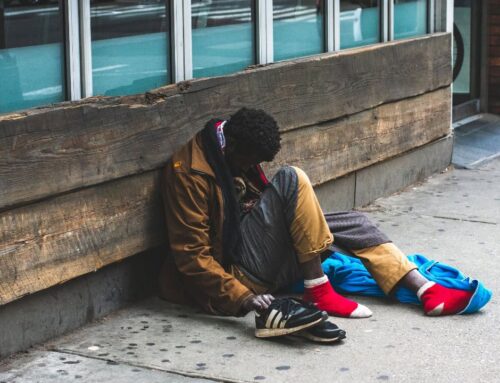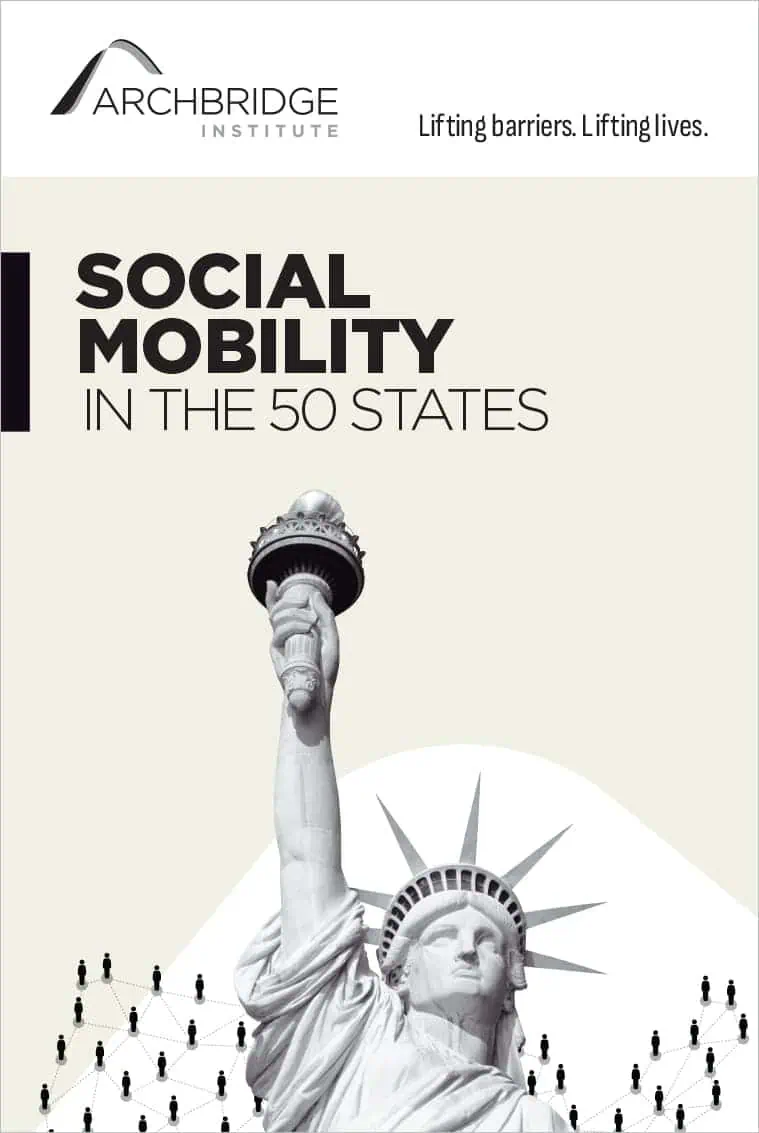
This report was published in partnership with the Pelican Institute for Public Policy.
What Is Social Mobility?
Social mobility is often defined in terms of generational improvement, for example, children being wealthier than their parents. When people discuss the American Dream, social mobility is a key part of the conversation, but what it really means is having the ability to live your best life. Depending on the person, this could be having the highest possible paying job; having a work-life balance that allows comfort and stability but also time with your family; paying off student loans; or broadly achieving certain goals (buying a home, having children attend college, finishing a degree). The American Dream is still alive and well; in a recent survey from the Archbridge Institute, over two-thirds of Americans state that they have reached or are on their way to achieving their American Dream. However, the accessibility of that dream differs across states. In the Archbridge Institute’s Social Mobility in the 50 States report, Louisiana ranked dead last in the country for supporting social mobility, making the American Dream correspondingly difficult to achieve.
This report builds on the findings from that index, which analyzed each state using a holistic framework for the American Dream. We used four broad areas that previous research has shown to be a factor in social mobility:
- Entrepreneurship and economic growth
- Institutions and the rule of law
- Education and skills development
- Social capital
These are holistic in the sense that they address mobility across all stages of life (childhood, college-age, and working-age), along with artificial and natural barriers.
Artificial barriers are government policies that impact mobility. These include barriers to entry for work (business regulations and occupational licensing), protection of property rights (high quality court and legal system, control of corruption and burdensome government overreach), and educational attainment (school choice, university quality). Natural barriers are more localized and not as directly tied to government policies. These include parental engagement (stable families) and a well-rounded society (soft skills, crime rates, and strong communities). This report focuses on Louisiana’s artificial barriers–man-made problems that can be solved with man-made solutions.
Louisiana: Not Last for Long?
While Louisiana ranked 50th in the country overall, there are many variables that go into determining mobility in a state. We start with the measures to gauge where Louisiana stood when the report was written, and changes made since that point toward improvements in future editions of the index.
Entrepreneurship and Economic Growth
Relative to other areas, Louisiana ranks the best in entrepreneurship and growth. However, it still ranks below average (29th). Within this area, it scores well in the subcategory of regulations (17th), but quite low in taxes (33rd) and business dynamism (44th).
Louisiana does relatively well in occupational licensing; however, according to the Institute for Justice’s License to Work report, Louisiana ranks last for licensing low-income occupations. This means that people who are already in a more difficult economic situation often face the formidable artificial barrier of getting the government’s permission to work. This is a large damper on mobility. Fortunately, Louisiana made meaningful strides in this area in the last year by removing its ludicrous licensing requirement for florists. Even more importantly, the state implemented universal license recognition, which allows people to transfer licenses they obtained elsewhere to Louisiana when they move into the state. This change should help mitigate Louisiana’s high outward migration rates.
Louisiana is slightly above average in its number of business regulations. As of 2021, Louisiana had 174,000 restrictive words in its regulatory code book. Regulations are equivalent to a tax on new and budding firms. Many neighboring states are less restrictive. For example, Alabama had just 111,000 restrictive words, and Mississippi 121,000.
For a long time, Louisiana has had one of the least competitive tax codes in the Gulf South. At the time of the index being published, Alabama, Georgia, Mississippi, Arkansas, Tennessee, and Florida all had lower corporate tax rates. Individual income taxes were also more burdensome than most of the above-named states, along with Texas. Sales taxes were also some of the highest in the country.
Fortunately for Louisiana residents, the state has made strides here. While Louisiana increased its sales tax rate marginally (to where it is now the highest in the country), Louisiana passed a reduction in the top corporate tax rate to 5.5%, compared to its previous high of 7.5%. Louisiana also implemented a flat income tax of 3%, lower than the previous tiered system that could get to 4.25%. It also tripled the standard deduction from $4,500 to $12,500 to ensure individuals who had fallen to a rate lower than 3% would not pay more in income taxes. While these are significant improvements, other states have followed suit. These changes would only improve Louisiana’s overall rank by two spots. However, there is positive momentum to keep and perhaps even improve tax competitiveness.
Another area where Louisiana falls fairly short is in business dynamism. At the time of the index’s publishing, Louisiana ranked 44th. Alabama (40th), Florida (10th), Mississippi (19th), and Texas (5th) all ranked better.
Within different indicators of business dynamism, we can get a better idea of exactly where Louisiana lags behind its Gulf South neighbors. Core start-up rates were at just 6.8%, noticeably lower than Florida and Texas, and tied with Mississippi. In 2021, Louisiana actually had negative firm growth. For comparison, Florida had a growth rate of 0.61%, and Texas was just a tick above at 0.62%. Alabama and Mississippi also saw a decline in total firms, but at a slower rate than Louisiana. Louisiana also stands out as being one of the least innovative states. It boasts just 1 patent per 10,000 individuals. Florida is over double this, and Texas is more than four times better.
As the entire country has faced a higher cost of housing, Louisiana is struggling even compared to that baseline. It has a lower than average number of housing permits per 1,000 people (just 3.7). For reference, the average housing permits per 1,000 is 4.3 across the states. Basic economics suggests that lower prices can come from an increase in supply; however, it also tells us that this lack of housing permits can be due to outmigration (or a decrease in demand for living there). Sadly, this is the case in Louisiana, which lost on net 31,000 individuals in the past year. Residents are moving to more economically promising states like Texas and Florida. Keeping up with the reforms in those states will start to improve the negative outmigration that has happened every year in Louisiana since 2016, but making Louisiana a place with affordable living conditions will be a necessary condition before that will happen.
Institutions and Rule of Law
It will surprise no one in the state that Louisiana fails miserably on legal systems and rule of law. Louisiana ranked last in this area according to the index. Most Gulf South states also scored low, but last is last. Corruption perceptions in Louisiana are and have consistently been the worst in the country. This is true for both traditional corruption like bribery and quid pro quos. Corruption conviction rates for Louisiana public officials are consistently among the highest in the country. Legal but morally questionable activities like political favoritism and lobbying are also near the worst in the country. Louisiana’s corruption is embedded in its system, and serious steps need to be taken to fix this.
The U.S. Chamber of Commerce’s Institute for Legal Reform ranks Louisiana as having the second-worst quality legal system in the country. A state’s legal system competency is one of the highest priorities for businesses when deciding where to move. About 90% of the respondents in the Chamber of Commerce’s survey said that a state’s liability system is a significant determinator of business decisions. Over 10% of respondents stated that New Orleans was one of the worst, least-fair legal systems in the country. In this survey, they found that Louisiana ranked last in trial judges’ impartiality, and in the bottom two for trial judges’ competence and the quality of the appellate review process.
This low ranking is in part driven by Louisiana’s poor tort system, where total cost per capita is over $4,000, or 3% of the state’s GDP. In Louisiana, this is largely driven by automotive and general/commercial litigation. This can help explain the seemingly ever-growing cost of home and auto insurance in the state.
Education and Skills Development
Education is one of the best mechanisms to succeed and prosper, particularly for those who come from a disadvantaged background. The Social Mobility in the 50 States report takes a holistic approach, including education throughout one’s life (4th grade, 8th grade, community college, and university), education freedom, and soft skills and parental engagement. Louisiana ranked last in education.
Fortunately, Louisiana has made great strides in this area. After COVID-19, education scores drastically decreased across the country. According to the Education Recovery Scorecard, Louisiana is the only state where the average student has surpassed pre-COVID scores. Students gained in reading and math, while many other states saw declines. Fourth-grade math scores rank Louisiana at 38th, up from 50th in 2019; for reading, scores jumped from last to 16th. Perhaps even more notable from a mobility standpoint, students with disabilities, as well as students from a lower income bracket, outperformed in Louisiana relative to the average.
Louisiana also now ranks 8th (up 17 spots) in education choice, in large part due to the passing of universal school choice and the creation of the state’s first education savings account. While there is still room for improvement, this is a sign of positive things to come for the state and its children.
However, universities in Louisiana could do a much better job providing a path to mobility for students. Louisiana universities rank second to last in the average return on investment for a four-year degree, netting the median graduate just above $18,000. In Alabama, the return is over $138,000; in Mississippi, $53,000; and in Texas, almost $160,000. Over 46% of Louisiana college graduates actually have a negative return on investment. However, this is not solely on the universities. Poor economic conditions make achieving the American Dream in Louisiana difficult relative to more prosperous states.
Further Reforms to Build on Momentum
As noted above, Louisiana has implemented some positive reforms in tax, education, and regulation in the last few years. The Pelican State should build on this momentum to become the gold standard in mobility, rather than the laggard. There are five key areas that Louisiana can address to become more competitive with its Gulf South neighbors.
Deregulation and Sunset Review Process
As previously mentioned, Louisiana has some of the highest restrictive language in the South. When we examine this at the industry level, we can get a better idea of areas where the state can cut.
A Mercatus Center policy brief compared regulations across eight southern states: Alabama, Florida, Georgia, Kentucky, Louisiana, Mississippi, South Carolina, and Tennessee. Louisiana stands out as having some of the highest regulations in petroleum products manufacturing, chemical manufacturing, food and beverage stores, insurance carriers, and waste management. Only South Carolina has more restrictive language in petroleum manufacturing, which can explain why a state once known for its oil production has seen many of its brightest in the area leave for opportunities in other states. Despite its rich history in food and culture, Louisiana has the most restrictive language for food and beverage stores among these states, having close to double the number of regulations relative to the next highest (also South Carolina). Only Mississippi has more restrictive language in the insurance markets, helping to explain why many insurance companies have left Louisiana, leaving its residents with seemingly ever-increasing insurance premiums.
Simply cutting many of these regulations, particularly in the above-mentioned sectors, would go a long way in making business in Louisiana more competitive. Regulations typically benefit established firms at the expense of new firms and “would-be” firms that do not exist due to the many barriers to entry. If Louisiana wants to see the same boost in business dynamism that its neighbors have, it needs to take regulatory reform seriously.
One way to cut regulation is to enact a “one in/two out” standard that would require the legislature or government agencies to eliminate two regulations in order to add a new one. This forces agencies and legislatures to seriously consider the full costs of regulation, along with decreasing the rate of new regulations. Another avenue would be a sunset review process for regulations. When a new regulation is added to the books, it should automatically lapse after a certain amount of time unless it is actively renewed (perhaps on a three- or five-year basis). This forces agencies and legislatures to vote to keep or reform regulations and allow time to quantify the relative rewards and costs of such regulations.
Occupational Licensing Reform
According to the Institute for Justice, Louisiana has the highest number of occupational licenses for low-income professions (77 out of 102 as of 2022). Fortunately, Louisiana removed perhaps the most ridiculous license in the country: florists. It was the only state in the country to have such a license. Similarly, universal licensing recognition is a great step in making it easier to move here.
However, there is still work to do on occupational licensing. For example, Louisiana is one of just three states that requires a license to be an interior designer, one of five states with licenses for non-instructional teacher assistants, and one of eight states with required licensing to be a tree trimmer. The interior designer license is particularly onerous, as it requires over 2,190 calendar days to obtain and fees approaching $1,500. Other unusual licenses include locksmiths (1 of 12 states), bartenders (1 of 12 states), and taxi drivers/chauffeurs (1 of 13 states). As Uber, Lyft, and ride-share drivers have become a norm in society, continuing to license taxi drivers is quite outdated. Much like regulations, a sunset review process should be implemented for occupational licenses to ensure they remain reasonable and relevant.
Further Tax Reforms Require Spending Cuts: A Constitutional Convention
Louisiana has passed a tax reform bill that cuts income and corporate taxes, but the sales tax burden is still the highest in the country. If Louisiana wants to not only catch up but become a leader in the Gulf South, the individual income tax rate must be more in line with Florida and Texas, two states that Louisiana citizens are consistently leaving the state for.
However, tax cuts require spending cuts. Louisiana ranks 21st in state spending per capita at over $9,300 per citizen. However, among Gulf South states, Louisiana’s state government spends more than Mississippi ($8,000), Alabama ($7,900), Florida ($5,200), and Texas ($4,460). Florida has nearly five times Louisiana’s population, but its state government only spends three times as much as Louisiana.
Spending cuts in Louisiana are difficult by design. The vast majority of Louisiana state spending is pre-determined and enforced by the state’s constitution. This leaves legislatures with few tools to meaningfully address spending. As currently constituted, the state has three large buckets to cut: higher education, health and hospitals, and correctional facilities. These are not the best places for spending cuts if we want to be mobility leaders in the South. The only way to address the root cause of this problem is through a constitutional convention. While relatively unorthodox, a convention like this would open up many more options and provide lawmakers with more flexibility in adjusting budgets over time.
In summary, we suggest four spending and revenue reforms:
- Phasing out the individual income tax over time.
- Having a flat and lower corporate tax.
- Slowly pulling back sales tax increases.
- Calling a constitutional convention to create the flexibility needed to address spending concerns.
The above reforms will help increase Louisiana’s return on investment for post-secondary degrees. First, higher education will no longer be one of the only options on the chopping block when funds are needed. Second, these economic reforms will increase opportunities for recent graduates, reduce the brain drain that has plagued the state, and lead to an overall increase in incomes.
Building on the School Choice Movement
While great progress has been made in providing more opportunities for the children of Louisiana, there remain subtle yet important changes that can still be addressed. In order to become a universal school choice leader, Louisiana could increase funding to education savings accounts through allocated state education spending, which would increase participation in the programs.
Legal Reforms
Tort reform and legal reforms more broadly are perhaps what are most needed in the state. Current practices cost residents money, increase corruption, reduce trust in institutions, and increase the cost of insurance.
One major starting point for reform can be in Louisiana’s unique pure comparative negligence law. It provides an avenue for someone to recoup damages even when they were largely at fault. In a drastic example, this means that if a plaintiff sues for $1 million, but found to be 99% at fault, they could still receive 1% (or $10,000). This incentivizes frivolous lawsuits that drive up expenses, benefiting personal injury lawyers. Most other states do not allow plaintiffs to receive anything if they are deemed to be more than 50% or 51% at fault.
Louisiana also has a high jury threshold for civil cases like this. In practice this means many lawsuits are determined solely by judges. Because Louisiana is prone to corruption of all kinds, this can lead to unfair outcomes based on favoritism rather than the merits of the case.
Louisiana also does not have a cap on contingency attorney fees, which leads to more frivolous lawsuits compared to other states. Implementing such a cap, combined with tightening laws on fraudulent claims, could help mitigate the sheer number of cases that are brought forward and make space in the justice system for legitimate cases.
The American Tort Reform Association has pointed out several recent examples of reforms that can be utilized in Louisiana. For example, Florida passed a law that brings more uniformity to its medical damage lawsuits, limits to contingency fees, and stricter guidelines for bad faith or flippant lawsuits.
Addressing these issues will help Louisiana combat corruption, lower insurance premiums, and allow for a justice system that better represents its citizens.
Conclusion: Build Back Better, Louisiana
No matter where a state lands in terms of social mobility, there is always room for improvement. Even the index’s top-ranking state, Utah, could stand to improve in regulation and predatory state action. The promise of the American Dream is that no matter your situation, you can create your own opportunity. This applies to states as well: with the right institutional environment and laws in place, they can allow people the freedom to create their own version of the American Dream.
This report has highlighted some key areas where Louisiana currently falls short, the momentum in the state from the last year, and how it can build on this success. However, momentum today does not guarantee momentum and growth in the future. The time is now to genuinely make the changes the Pelican State needs to prosper.
Read Social Mobility in the 50 States here.
Justin Callais, PhD, is the Chief Economist at the Archbridge Institute. He leads the institute’s “Social Mobility in the 50 States” project and conducts original research on economic mobility, economic freedom, economic development, and institutional analysis. Follow his work @JustinTCallais and subscribe to his newsletter, Debunking Degrowth.





